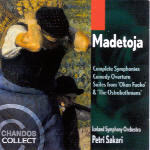This set reissues at mid-price the contents of two full CDs containing Leevi Madetoja’s complete symphonies and other selected orchestral music. Sibelius overshadowed Madetoja’s reputation, of course, but this younger contemporary of the great Finnish master had much to say and does not deserve his comparative neglect. The three symphonies clearly show him moving from the Sibelian First, to a passionate, personal, Romantic phase in the turbulent Second Symphony, and culminating in the lucid, neo-classical Third, an eloquent masterpiece easily the equal of Sibelius’ late works. The other orchestral works are charming, and include a folk-influenced suite from the magnificent opera The Ostrobothnians, and some quirky excerpts from the ballet Okon Fuoko, a work I’d dearly love to hear complete. Petri Sakari’s performances are generally very good. The Second Symphony is the finest performance available, though the Third is rather dimly recorded compared to the two versions on Finlandia (neither of which may be available at present). Marvelous music, though, and well worth hearing. [9/25/2000]
































